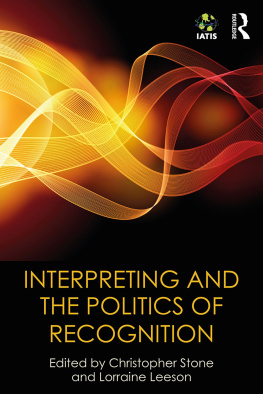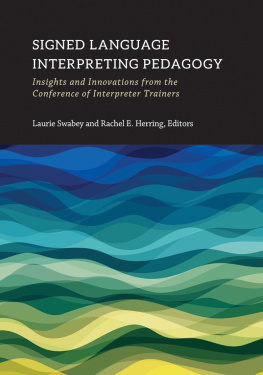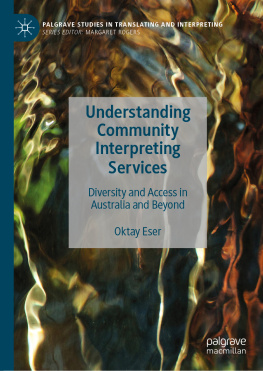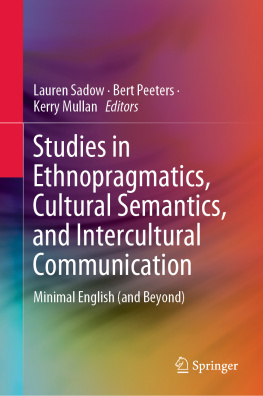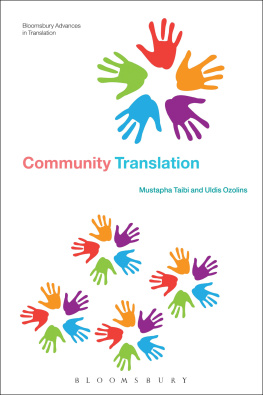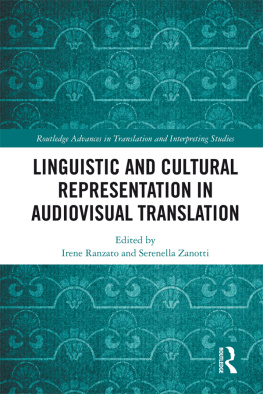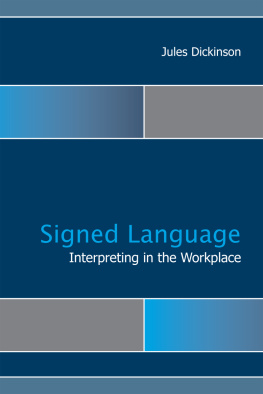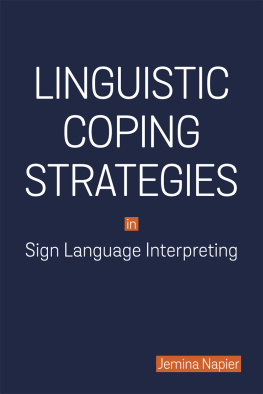Interpreting and the Politics of Recognition
Interpreting and the Politics of Recognition investigates the historical, ethical and professional dimensions of this, arguably, most widespread form of intercultural communication. Covering key topics from colonialism to representation, ethics and power, it looks at the different linguistic modalities (signed and spoken) used within communities to investigate equality of citizens.
The contributors include leading authorities in their fields and use a wide spread of examples from a variety of disparate cultures including deaf and ethnic minority groups. With eight chapters presented in three thematic sections and a foreword by Michael Cronin setting the book in its wider context, this volume will be of interest to practising interpreters, researchers and advanced students in the areas of Interpreting Studies, Translation Studies, and Linguistics and Communication Studies.
Additional resources for Translation and Interpreting Studies are available on the Routledge Translation Studies Portal: http://cw.routledge.com/textbooks/translationstudies.
Christopher Stone is a Senior Lecturer and Co-Course Leader in Deaf Studies and Interpreting at the University of Wolverhampton, UK. His publications include Deaf Interpreters at Work: International Insights (with Robert Adam, Steven Collins and Melanie Metzger [eds.], 2014).
Lorraine Leeson is Professor of Deaf Studies at the Centre for Deaf Studies at Trinity College, Dublin, Ireland. Her publications include Sign Language in Action (with Jemima Napier, 2016), Irish Sign Language (with John I. Saeed, 2012), Working with the Deaf Community (with Myriam Vermeerbergen [eds.], 2012), and Signed Language Interpreting (with Svenja Wurm and Myriam Vermeerbergen [eds.], 2011).
The IATIS Yearbook
Series editor: Jenny Williams
The International Association for Translation and Intercultural Studies (IATIS) is a worldwide forum designed to enable scholars from different regional and disciplinary backgrounds to debate issues pertinent to translation and other forms of intercultural communication.
The series aims to promote and disseminate innovative research, rigorous scholarship and critical thinking in all areas of translation studies and intercultural communication.
For more information or to order, please go to https://www.routledge.com/The-IATIS-Yearbook/book-series/IATIS
Authorizing Translation
Michelle Woods
Human Issues in Translation Technology
Dorothy Kenny
Interpreting and the Politics of Recognition
Christopher Stone and Lorraine Leeson
Interpreting and the Politics of Recognition
Edited by Christopher Stone and Lorraine Leeson

First published 2018
by Routledge
2 Park Square, Milton Park, Abingdon, Oxon OX14 4RN
and by Routledge
711 Third Avenue, New York, NY 10017
Routledge is an imprint of the Taylor & Francis Group, an informa business
2018 International Association for Translation and Intercultural Studies / IATIS
The right of Christopher Stone and Lorraine Leeson to be identified as the authors of the editorial material, and of the authors for their individual chapters, has been asserted in accordance with sections 77 and 78 of the Copyright, Designs and Patents Act 1988.
All rights reserved. No part of this book may be reprinted or reproduced or utilised in any form or by any electronic, mechanical, or other means, now known or hereafter invented, including photocopying and recording, or in any information storage or retrieval system, without permission in writing from the publishers.
Trademark notice : Product or corporate names may be trademarks or registered trademarks, and are used only for identification and explanation without intent to infringe.
British Library Cataloguing in Publication Data
A catalogue record for this book is available from the British Library
Library of Congress Cataloging in Publication Data
A catalog record for this book has been requested
ISBN: 978-1-138-66679-5 (hbk)
ISBN: 978-1-3156-1922-4 (ebk)
Typeset in Times New Roman
by Deanta Global Publishing Services, Chennai, India
For Rose and Des Leeson thank you for encouraging those childhood trips to the library.
For The Posse, and my family thanks for being there.
Contents
BINHUA WANG AND FANG TANG
BEPPIE VAN DEN BOGAERDE AND ADDE WOEST
LORAINE LEESON, MIRANDA STEWART, CASEY FERRARA, IVY BOSTOCK, PETER NILSON AND MARLON COOPER
MARY PHELAN
ILANA ROZANES
JEREMY BRUNSON
STEPHANIE FEYNE
DEBRA RUSELL
Michael Cronin
In their work on language practices in urban spaces, Alastair Pennycook and Emi Otsuji note the parallels between different sites of multi-language use:
There are many strong parallels between the multilingual contexts that we focus on in cities and the studies of dynamic change, multivocality and local language practices within a wider focus on globalization in peripheral Smi, Irish, Corsican and Welsh language contexts.
(Pennycook and Otsuji 2015: 30)
Translation as a named language practice is, however, absent from Metrolingualism . The ethnographic research informing the work depends, in part, on the interpreting skills of the co-researchers to understand and communicate what is going on in the different sites of ethnographic enquiry, but interpreting as a specific kind of activity in the multilingual city is ignored. This is despite the fact that there is an acknowledgement that in the case of migrants, linguistic networks may provide work, but one is often dependent on other linguistic mediators (ibid: 39). What is significant, however, from the point of view of the central concern of this present work is the stress in Pennycook and Otsujis work on the quotidian nature of multilingual language practices which are widespread across the planet. In their version of a grassroots globalization, or a globalization from below, cities are the sites of continuous, unceasing metrolingualism, which they have defined as the ways in which people of different and mixed backgrounds use, play with and negotiate identities through language (Pennycook and Otsuji 2015: 244). Crucially, however, and this is a key contribution of Interpreting and the Politics of Recognition , this notion of language must include sign language so that we have inclusive rather than exclusive definitions of metrolingualism, multilingualism and polylingualism. It is, of course, the sights and sounds of this metrolingualism which has mobilized many European populist movements and conservative parties in their repeated calls for stringent language tests and the removal of budgets for the provision of community translation and interpreting services. In the 2015 general election manifesto for the British Conservative Party, under the heading, We will promote integration and British values, voters are told that:
Being able to speak English is a fundamental part of integrating into our society. We have introduced tough new language tests for migrants and ensured councils reduce spending on translation services. Next, we will legislate to ensure that every public sector worker operating in a customer-facing role must speak fluent English. And to encourage better integration into our society, we will also require those coming to Britain on a family visa with only basic English to become more fluent over time, with new language tests for those seeking a visa extension.
(Conservatives 2015: 31)

